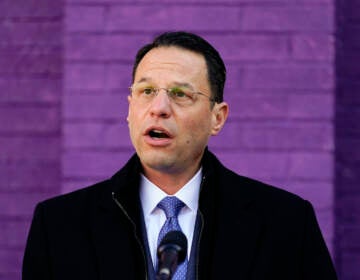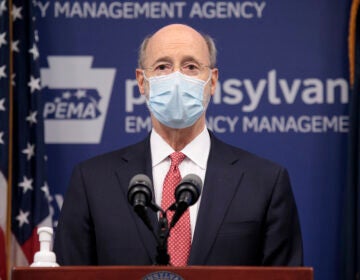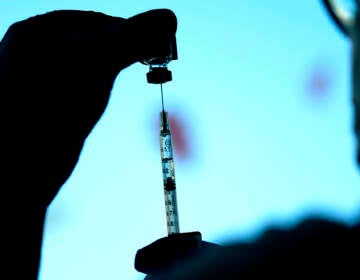Coronavirus update: First person to die of COVID-19 in PA prisons was fighting for innocence
More than 20 local immigrant justice organizations held a press conference today, calling on city and state officials to protect all Pennsylvania workers and residents.
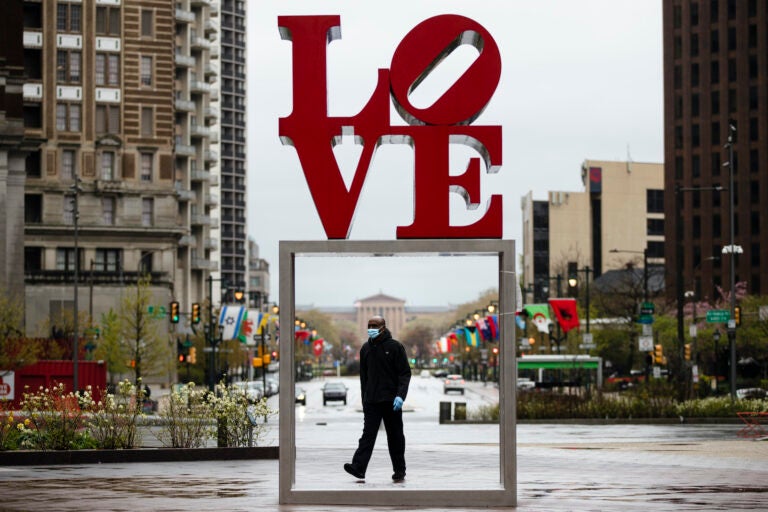
A person wearing a protective face mask and gloves as a precaution against the coronavirus walks through Love Park, in Philadelphia, Monday, April 13, 2020. (Matt Rourke/AP Photo)
Updated at 8:20 p.m.
–
Are you on the front lines of the coronavirus? Help us report on the pandemic.
As of Tuesday, there are 25,354 confirmed COVID-19 cases in Pennsylvania, 68,824 in New Jersey, and 1,926 cases in Delaware. Philadelphia has 7,130 cases.
Pennsylvania’s death toll stands at 659, New Jersey’s at 2,805, and Delaware’s at 43. Philadelphia’s death toll is 206.
First person to die of COVID-19 in PA prisons was fighting for innocence
The first person to die from COVID-19 inside one of Pennsylvania’s state prisons has been identified by the Pennsylvania Innocence Project, a nonprofit that works to exonerate people convicted of crimes they did not commit.
Rudolph Sutton died while incarcerated at SCI-Phoenix in Montgomery County. He was 67.
The Pennsylvania Innocence Project had been assisting Sutton in overturning his conviction at the time of his death. He had served 30 years in prison.
“Mr. Sutton should never have been incarcerated in the first place,” said Nilam Sanghvi, legal director of the Pennsylvania Innocence Project, in a statement.
Experts have called the spread of coronavirus in prisons and jails a grave public health concern.
Nan Feyler, the Pennsylvania Innocence Project’s executive director, called Sutton’s death a “tragic failing,” heightened by the possibility that swift action could have prevented his death from happening.
The nonprofit will continue its efforts to clear Sutton’s name, as well as those of his co-defendants.
“My father always maintained his innocence and believed someday he would be free,” said Sutton’s son, Rudolpho Sutton. “Our family is devastated by his passing but hope his death will lead to quicker actions to release his co-defendants and others who do not belong in prison.”
Montgomery County announces effort to track COVID-19 cases in nursing homes
Montgomery County reported 99 new positive cases of COVID-19 since yesterday, bringing the county total up to 2,123. Since yesterday, 18 more Montgomery County residents have died due to COVID-19, bringing the total number of deaths to 109.
The county is relocating its drive-through community testing site to the campus of Montgomery County Community College in Whitpain Township. The new site will open Thursday, Apr 16 at 10 a.m. Testing will be done with self-swabs. Appointments can be made at montcopa.org/covid-19 or by calling 610-631-3000.
The county announced a new partnership to track COVID-19 cases in its long-term care facilities. It is teaming up with a health care analytics company called Real Time Medical Systems. The company has a cloud-based software that can pull data around-the-clock from electronic health records, with the goal of identifying potential disease hotspots.
Valerie Arkoosh, chair of the Montgomery County Board of Commissioners, said letters went out to nursing homes today “asking them to volunteer to participate in this opportunity to share anonymous patient data, including numbers of patients with fever or cough, with our Office of Public Health. The goal, she said, is to “assist these facilities with trend-tracking and early response.”
Most of Montgomery County’s coronavirus deaths to date have occured in nursing homes. Dr. Arkoosh said today that, including residents and staff, there are 587 cases of COVID-19 across 73 long-term care facilities in the county.
Arkoosh also fielded several questions about when businesses will start opening again. It’s a question on more and more people’s minds these days: When might life return to normal?
Arkoosh’s response? “We’re not there yet,” she said. “The last thing that any of us want to do is find that we lifted these restrictions too early.”
She noted that Japan, Hong Kong and China are seeing a resurgence of COVID-19 infections after having lifted mitigation measures. “They’re back to double-digit cases, and they’re putting those restrictions back on,” Arkoosh said.
Arkoosh said, according to the science she’s seen, it’s best to wait until infection rates are “down to zero,” and then wait at least another two weeks, before relaxing constraints.
Depending on when treatments and vaccines are developed, it could be another year or more before life goes back to resembling something like it did six weeks ago, Arkoosh said.
But, she added, this won’t last forever. And the way to make that period as short as possible is to continue social distancing.
Philadelphia orgs demand protections for immigrants
More than 20 local immigrant justice organizations held a press conference today, calling on city and state officials to protect all Pennsylvania workers and residents, regardless of immigration status, language or criminal record.
Among other demands, the organizations asked that people be guaranteed access to testing and health care facilities without fear that ICE may arrest them while seeking medical attention.
They also called for the Berks County Detention Center to be shut down permanently, and for stimulus and unemployment benefits to be made available to all workers, regardless of immigration status. Currently, only U.S. citizens and permanent residents are eligible to receive state unemployment benefits or a stimulus check from the federal government.
Our communities are “always in the last thoughts of politicians and people who make decisions about our lives,” said Blanca Pacheco, co-director of the New Sanctuary Movement of Philadelphia, a coalition of faith-based groups dedicated to ending injustices against immigrants.
Pacheco said that people who are undocumented work on farms, serve food in restaurants, clean people’s houses and provide other essential services. “We contribute in many ways,” she said, “yet when the time of a pandemic comes, we are the first ones left behind.”
When asked about financial support for undocumented residents, Mayor Kenney said the city is doing its best to raise money through its PHL COVID-19 Fund, which provides grants to Philadelphia organizations working with vulnerable communities.
He urged anyone who may be looking to donate their stimulus check to consider the city’s fund, adding that there are no administrative fees and 100% of donations go to local nonprofits.
Philly releases preliminary infection data by race
Thomas Farley, the city’s health commissioner, announced preliminary numbers for the racial distribution of COVID-19 infections in Philadelphia. They are:
- 34% Unknown race/ethnicity
- 40% Black
- 14% White
- 6% Latinx
- 2% Asian
- 2% Other
Infection rates suggest that Philadelphia is “flattening the curve with social distancing,” Farley said, but “the virus is still circulating in the city, even if it’s circulating at lower levels.”
He added that there’s “no question” that if we stopped social distancing now, infection rates would surge and hospitals would struggle to respond.
Currently, 37% of hospital beds and 30% of ICU beds in Philadelphia are still available, Farley said. There are 575 people infected with COVID-19 in city hospitals, and 1,361 people in hospitals across the region.
Of the city’s 206 deaths so far, about half have occurred in nursing homes. About two-thirds of the deceased have been people over the age of 70.
Smoking puts people at higher risk of COVID-19 infection, Farley said. He urged smokers to visit http://smokefreephilly.org/ or call 1 800 QUIT-NOW.
State reminds health care providers and laboratories to collect racial data
Health providers and laboratories are required to collect racial data for COVID-19 patients, but that information is missing in about 60% of the patient reports submitted to the state, according to Pennsylvania Secretary of Health Rachel Levine.
In her daily briefing Tuesday, Levine reminded those workers of the need to collect racial data.
Early numbers available in cities such as Philadelphia have shown African Americans account for a disproportionate number of COVID-19 deaths, and health officials are scrambling to collect better information.
Levine thanked health providers and laboratories for their work during the pandemic, “But also for inputting this data now and helping us make the most informed public health decisions that we can by providing us with the best data possible.”
Still, enforcing the data requirement is difficult, per Levine.
“So we’re going to rely upon all of our health care personnel and laboratories to do the right thing and to fill out that information for us, so we can have the right demographic data to make the right decisions,” she said.
First death in Philadelphia prison system
A woman who was incarcerated in Philadelphia passed away from COVID-19 today. Hers is the first COVID-related death in the city’s prison system.
Out of respect to her family, the city will not be releasing the woman’s name. Officials say she was in her 40s and had underlying medical conditions. She was transported to a hospital last week and was under medical surveillance, but she succumbed to the virus this morning. She was in the prison system for more than 500 days, according to city officials.
Mayor Kenney said that the city is committed to criminal justice reform during this time. The city has been holding virtual hearings in municipal court to expedite the release of incarcerated people held for low-level offenses. In the last month, the population of Philadelphia’s prison system has decreased by about 13 percent.
The city’s prisons department has declared shelter-in-place across all of its facilities. City officials say they have issued masks to all people incarcerated within its prison system.
Currently 54 people incarcerated in Philadelphia jails are infected with COVID-19. Four people are in isolation, and three people are hospitalized. An additional 13 people have recovered and have been removed from isolation. In total, 88 people have been tested.
Growth of new Pa. cases continues to slow
The Pennsylvania Department of Health reported on Tuesday that there are 1,146 new positive cases of COVID-19 in the state, along with 60 new deaths. County-specific information is available here.
So far the number of new cases in Pennsylvania are lower this week compared with last, and the rate of spread appears to be slowing. Since Monday, there has been a 4.7% growth in new cases. That rate is the lowest it has been since before the state’s stay-at-home orders began in March.
Newly reported deaths are up slightly from Monday, but since last week, the number of new deaths in the state appears to be declining. Experts expect that, as the virus’s spread is contained, the peak in new confirmed cases will lag behind the peak in deaths.
“Even though the daily increases are not exponential, now is not the time to become complacent,” said Health Secretary Rachel Levine. She urged Pennsylvanians to continue observing social distancing and to wear masks in public.
Levine said the timing had to be just right when it came to easing social distancing guidelines. Whether opening the state back up in a county-by-county or regional fashion, the process would happen in a “slow, progressive fashion.”
According to state data, roughly 10% of the state’s COVID-19 cases, more than 2,300, have required hospitalization. Of those, more than 600 needed ventilators.
The state has 42% of beds, 37% of ICU beds, and 70% of its ventilators still available.
Of the state’s more than 25,00 cases, 1,250 are health care workers and 1,869 cases are among seniors living in long-term care facilities such as nursing homes.
Pa. State Police urge Asian Americans to report hate crimes
The Pennsylvania State Police want Asian Americans to come forward and report hate crimes related to the COVID-19 outbreak.
To date, state police haven’t been asked to investigate any COVID-19 related hate crimes against Asian American communities, officials said Tuesday.
State police, who have been monitoring social media as well as “backroom chatrooms,” say they’re not seeing hate crimes against Asian American communities in Pennsylvania being encouraged online.
But that’s not to say there aren’t bias incidents happening in Pennsylvania, as seen across the country.
“They may not want to report it for fear of embarrassment. They may not want to report it because they don’t think they’ll get the community support, or they don’t think law enforcement will take their concerns seriously,” said Lt. William Slaton, commander of the Pennsylvania State Police Heritage Affairs Section.
Slaton said the department has distributed letters to community groups encouraging victims to come forward if they’ve been victims of harassment. If there are fears of dealing with police, people can call an anonymous tip line at 1-800-4PA-TIPS.
“We’re not going to tolerate bias and we’re going to commit to a prompt and thorough investigation,” he said.
If someone has been a victim of a hate crime, they should immediately contact their local law enforcement. PSP will get involved if local law enforcement agencies or community advocates ask them for help.
Reading Terminal pausing delivery
The Reading Terminal Market is suspending its delivery services until Apr 20, after it experienced system errors last week.
Prior to the coronavirus outbreak, the market was averaging about 50 delivery orders per day, said Anuj Gupta, the market’s general manager, in a press release. By Easter week, it was receiving 8,000 to 10,000 orders per day.
The market did not have time to adjust to the upsurge in orders, which caused errors in delivery. “We let some of you down,” Gupta said, and “we are truly sorry for that.”
During the pause, the market will work with its e-commerce service, Mercato, to improve its delivery system.
Rite Aid to open more drive-up testing sites
In addition to its drive-up testing site in Philadelphia’s West Oak Lane section, Rite Aid has added a new COVID-19 testing site in Harrisburg with more expected to open in Pennsylvania and New Jersey.
The new Harrisburg site will be open for testing from 9 a.m. to 5 p.m. seven days a week and expects to conduct about 200 tests per day.
Testing at the site, located at 2604 Linglestown Road, will take place in the store’s parking lot. People must remain in their vehicles during testing. Patients must be at least 18 years old and are required to provide government-issued identification.
People who wish to be tested must pre-register online, and they will be triaged based on CDC guidelines. Testing will be available at no cost to individuals who meet CDC criteria.
In a press release, the pharmacy chain announced that, in the coming weeks, it will open additional testing locations in Pennsylvania and New Jersey, in coordination with the U.S. Department of Health and Human Services. All Rite Aid drive-up testing locations will use self-swab nasal tests overseen by pharmacists.
Philly Water Department to residents: flush toilet paper only
The Philadelphia Water Department said Tuesday that it has seen a dramatic increase in flushed sanitary wipes at the city’s water pollution control plants and pumping stations. The utility is asking residents to stop flushing anything other than toilet paper along with bathroom waste.
Sanitary wipes can “clog pipes at home, in the street and at our facilities,” said Philadelphia Water Department Commissioner Randy E. Hayman in a statement. “Even wipes sold as ‘flushable’ often don’t have science to back up that claim.
“It may seem like a small thing, but it can have a big impact at a time when we need everyone to work together,” Hayman added.
Other commonly flushed items that can cause problems include surface cleaning wipes, paper towels, tampons, tooth floss and cigarette butts.
WHYY’s Ximena Conde contributed reporting.
WHYY is your source for fact-based, in-depth journalism and information. As a nonprofit organization, we rely on financial support from readers like you. Please give today.


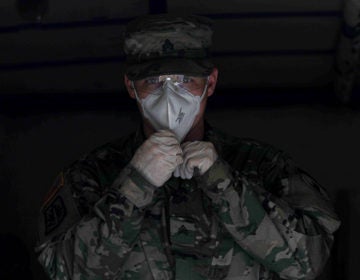
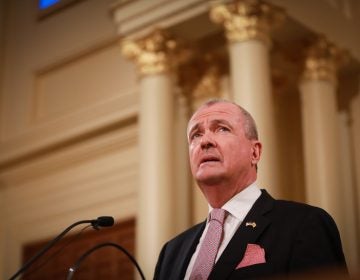
![CoronavirusPandemic_1024x512[1]](https://whyy.org/wp-content/uploads/2020/03/CoronavirusPandemic_1024x5121-300x150.jpg)
